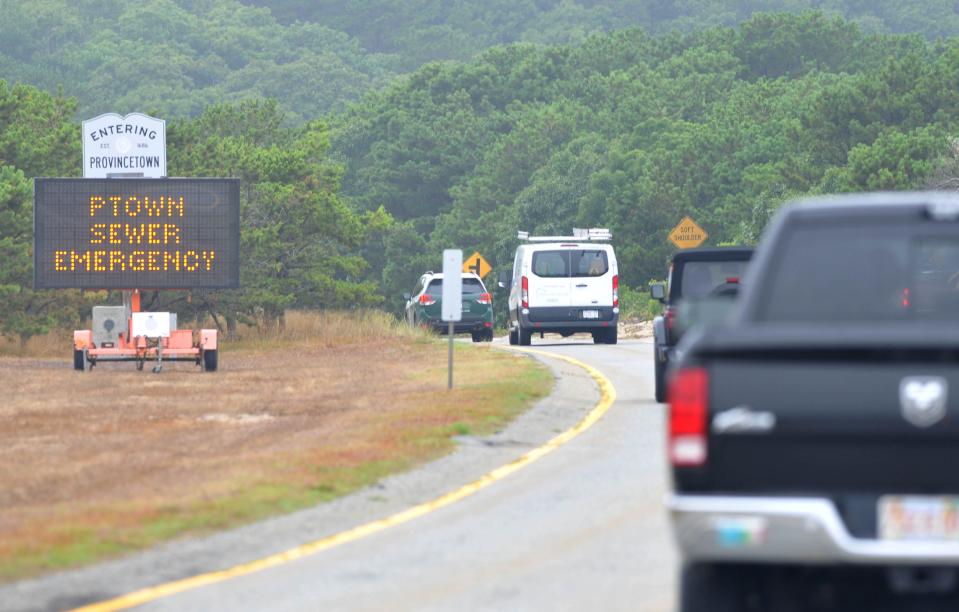Provincetown sewer articles sail through special town meeting
PROVINCETOWN – A packed auditorium approved five sewer-related articles nearly unanimously on Wednesday at a special town meeting. The articles authorized borrowing $75 million for sewer expansion, modernizing the existing sewer system, ending the town’s checkerboard sewer district, altering Route 6 to combine two town-owned lots for a satellite treatment facility, and allowing the use of a recreation field for subsurface wastewater disposal.
One article on using Land Bank funds to purchase 1.9 acres on Commercial Street passed easily. So did an article authorizing the town to fund $145,000 to develop a lead service line inventory. New EPA guidelines require all public water systems to complete such an inventory by October 2024.
An article to amend town zoning bylaws was indefinitely postponed.
Town Manager Alex Morse took about an hour to explain the details of each sewer article, why they were necessary and what the costs would be. He gave a tentative timeline for the project, and stressed that without those measures, the town's development would be hog-tied.
Morse called the five sewer articles distinct and different but all interrelated. Their passage would protect public health, double the number of potential sewer users, reduce the danger of harbor and environmental degradation, and would advance the town’s housing goals.
He called it the most significant project of this generation, one that’s been years in the making.
“All property owners need to take responsibility to take care of their waste,” Morse said. “This is about access, choice and fairness.”
He stressed the need for modernization and expansion, the availability of money that the town and townspeople can access, and the real threats to the environment and the town’s development should nothing be done. And he brought up the vacuum sewer emergency shutdown in August as a reminder of what can happen if the town doesn't act.

The downtown vacuum sewer system was designed to handle 350 properties 20 years ago. It now serves 575 properties. New equipment, pumps and repairs are needed to keep the system’s infrastructure reliable. The town has access to $4.4 million in Cape Cod and Islands Water Protection Fund grants, with additional grants from the Municipal Vulnerability Preparedness Program.
The most significant article was the $75 million to extend gravity sewers to the remaining properties in town and improve wastewater treatment and disposal capacities. It will provide for 20 years of managed growth. An estimated 40% will come from grants, subsidies, Chapter 90 paving funds and rooms tax receipts. An estimated $45 million will come from betterments assessed on properties.
Connection costs will vary according to property layout and distance to sewer lines. Estimates range from $2,500 for a simple installation to $15,000 for a complex one.
Betterment costs will be based on the number of bedrooms, with adjustments for those properties requiring grinder pumps. A per-bedroom betterment cost of $7,150 can be paid in full or spread over 20 years.
People have choices, Morse stressed. They can replace on-site systems and delay their connection and betterment costs, or they can connect and start paying. He said a vast majority of property owners want to connect based on survey data.
“About 250 properties in current sewer area want to connect now and have been interested for years,” he said.
Some property owners might want to replace onsite systems rather than connect to sewers, but they must get approval from the health department, and comply with any new DEP regulations, including denitrification requirements.
“Those are only going to get more difficult and expensive,” Morse said. “Properties will essentially need their own treatment plants in their yards. We're very dense community and you’re not going to be able to fit these systems there.”
There will be a sewer stub at every property.
“When something happens to an onsite system, you have to call somebody,” Morse said. “If you’re connected to town sewer, you have a whole cadre of responders.”
Passage of a home rule petition to use Motta Field for wastewater disposal drew the most public comments. It was amended to read that subsurface waste water disposal would be "post treatment."
One resident objected to the location of the planned satellite treatment facility on a soccer field along Route 6 because of its proximity to homes. Morse said the town must ensure DEP standards, and 500-feet distance was in line with those standards. He said the soccer field location was the best possible one for the town because of conservation, residential and environmental concerns.
With authorization from town meeting, Morse said Provincetown will continue to lead the way on climate resilience and wastewater treatment.
Contact Denise Coffey at dcoffey@capecodonline.com. Follow her on Twitter: @DeniseCoffeyCCT.
This article originally appeared on Cape Cod Times: Provincetown sewer articles pass easily at Special Town Meeting

